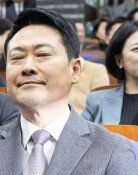[Editorial] Political Intentions
[Editorial] Political Intentions
Posted February. 09, 2010 09:00,
Chung Sye-kyun, the chairman of the main opposition Democratic Party, said Sunday, I dont oppose an inter-Korean summit despite its political intentions and attempt to promote the ruling partys election campaign. I urge the administration to put inter-Korean relations back to where it was through the summit even if it comes before the June 2 local elections. His comments might seem like an expression of support for the proposed summit promoted by the Lee Myung-bak administration. By unnecessarily mentioning political intentions with a negative connotation, however, Chung seems more interested in reducing the hype and stigmatizing the character of the potential summit.
The two previous inter-Korean summits organized by Democratic Party-led administrations clearly had political intentions. The holding of the first summit between then President Kim Dae-jung and North Korean leader Kim Jong Il in June 2000 was decided just three days before the general elections held April 13 of that year. The second summit between then President Roh Moo-hyun and Kim was announced on Aug. 8, 2007, just four months before the presidential election. The summit took place just three months ahead of the election. Developments leading to both summits were kept strictly secret, and North Korea was later found to have received 450 million U.S. dollars in return for holding the first summit.
These experiences have taught South Korea that however painful it might be to hold an inter-Korean summit, the process leading to one should be legitimate and reasonable with substantial meaning. The nation can no longer afford a summit that turns into a one-time show or is marred by political intentions. Moreover, substantial success has been elusive. The Democratic Party has constantly exaggerated the significance of the first two summits, yet makes the groundless claim that the incumbent administration is responsible for worsening inter-Korean ties. The party is the one to blame for giving unconditional support to the North under the pretext of the sunshine policy. This is the result of past summits that saw the South begging to the North with political intentions. These actions consequently allowed Pyongyang to develop a nuclear weapons program and hindered legitimate improvement in inter-Korean relations.
The Democratic Party plans to turn back the basis of the incumbent administrations North Korea policy to that of three or 10 years before. This intent is precisely reflected in Chungs comments. A summit that fails to urge the North to abandon its nuclear ambition and promote coexistence, reconciliation and cooperation will have no significance. It will simply be a waste of time.
The Democratic Party yesterday announced that the Norths human rights situation is deplorable, a great improvement from its past observations. Nevertheless, it is still against the approval of a North Korean human rights bill allowing the establishment of an organization dedicated to improving North Korean human rights and provision of support to relevant groups at the National Assembly. The party needs some soul-searching if it truly seeks to help improve inter-Korean ties in a legitimate way.







